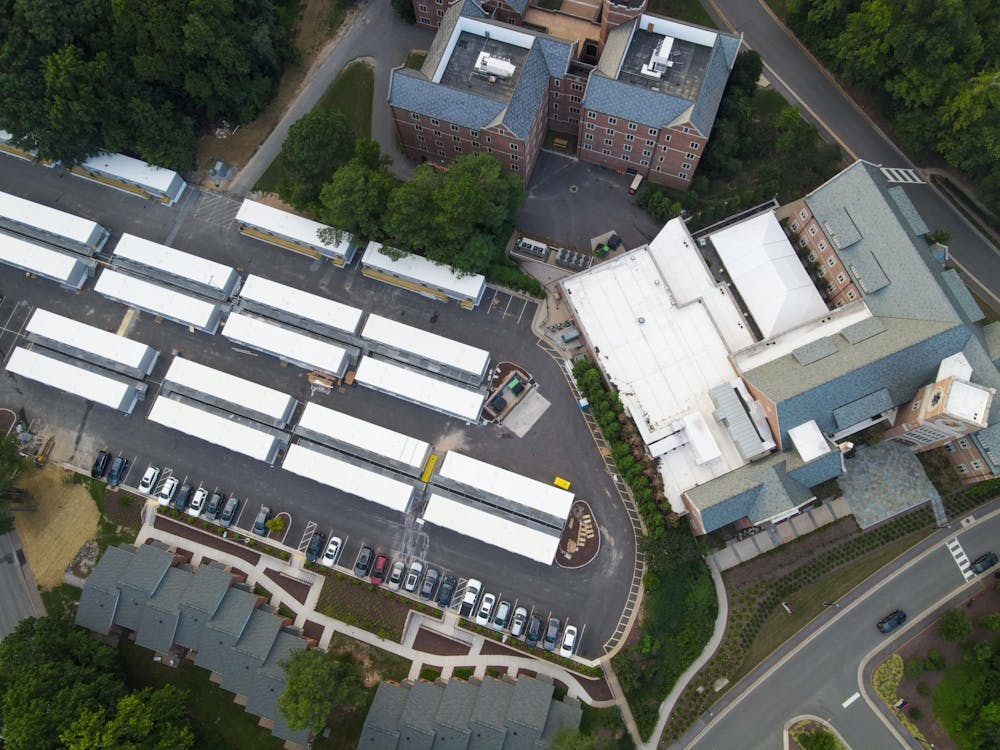There has been some uncertainty among University of Richmond students about what qualifies as a close contact and when someone should self-report or quarantine.
The Centers for Disease Control and Prevention defines a COVID-19 close contact as someone who has been within six feet of an infected person for at least 15 minutes total, over a 24-hour period starting from two days before the beginning of the infected person's illness, according to their website. UR has the same definition for close contacts.
Senior Jess Mahoney stayed at a friend's house off campus for one night before her on-campus move-in date and COVID-19 testing time slot, she said. Her friend tested positive for COVID-19 five days later, but Mahoney was not identified as a close contact because they had last seen each other outside the two-day-before-illness contact tracing window, she said.
Mahoney was contacted by her friend, not UR, about the positive case, and she decided to get tested off campus for peace of mind, she said.
"I know the school is very stretched with resources and this would be really hard to organize," she said. "But even if someone from the school had just called me to be like, ‘Hey, we know you saw someone who tested positive, but we're not contact tracing you to quarantine because it was far enough from when she tested positive, [I would appreciate that]. But, if you still want to get tested to be safe, go for it.'"
Contact tracing is subjective, because masks are not 100% effective and everyone's experience with someone who has tested positive is slightly different, Wendy Sheppard, assistant director of sports and risk management, said.
"Obviously [for] intimate partners or roommates that share the same room, even though you are wearing masks at all times, you're sharing the same air," she said. "You know, I have to be honest, it's not as black and white of an issue as people would like."
Sheppard is currently the supervisor of UR's contact tracing initiative, she said. Students who are symptomatic or have tested positive for COVID-19 need to reach out to the Student Health Center so the interview process can begin, she said.
"During their evaluation, student health will ask the positive cases to share close contacts," Sheppard said. "They will go over the definition of a close contact and ask students to share the list of names of people that could potentially be at risk.
"We don't share students' names with contacts unless that student has given us permission to do so."
Allison Rose, who became UR's recreation athletic trainer on Feb. 8, will help Sheppard with the job of contract tracing, Rose said.
"It has been my job to notify our contract tracers to go out and start the interview of the close contact to determine if they need to go out into quarantine," Rose said.
Enjoy what you're reading?
Signup for our newsletter
The university hired people to be contact tracers, but they are not contracted workers through a company, she said.
As Rose gets more experience in the position, she will take over the responsibility of managing the COVID-19 hotline. The UR hotline serves as a means to contact close contacts of positive cases; community members can also call in and ask questions, she said.
"[I would also be the] liaison between the Health and Wellbeing Center and residential life to make sure that we're checking in on our kids in quarantine to make sure they're not having any symptoms and getting them moved over properly," Rose said.
Sophomore Nina Price and her roommate called the Student Health Center on Feb. 17 after their suitemates were put into quarantine on Feb. 12, she said. Their suitemates in Gray Court had symptoms and had been exposed to people who tested positive for COVID-19, she said.
"Basically they said, 'We have to wait until after their test results come back to tell you anything,'" she said. "That was just frustrating because we were trying to plan out what to do about our quarantine, get ahead and make a plan, but they were pretty unhelpful honestly. They didn't even reach out to us."
When Price and her roommate were eventually contact traced, they were each given different information regarding what was allowed for quarantining, she said.
"They told me I could fly [home]," Price said. "They said basically, 'As long as you're off-campus, do what you want.' But they told [my roommate], 'You absolutely cannot fly,' so they were just telling us really contradicting things, which made it a lot more confusing for us."
The Student Health Center did tell them they could use on-campus quarantine spaces, she said.
It is important for students to be honest about possible exposures and speaking to Student Health or contact tracers will not lead to conduct violations, Sheppard said.
"They're not going to get in trouble for saying that they were at a party or an event," she said. "It's important that we capture what happened and the number of people that could be involved.
"The best way to stay on top of this situation, this pandemic, is to make sure that we know everybody out there who could potentially be a danger to the campus community."
Contact news writer Meredith Moran at meredith.moran@richmond.edu.
Support independent student media
You can make a tax-deductible donation by clicking the button below, which takes you to our secure PayPal account. The page is set up to receive contributions in whatever amount you designate. We look forward to using the money we raise to further our mission of providing honest and accurate information to students, faculty, staff, alumni and others in the general public.
Donate Now



